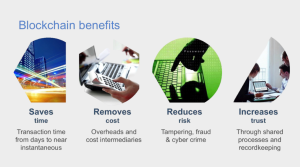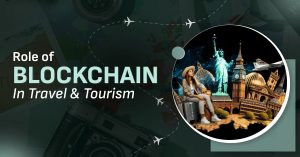Introduction
Travel is changing fast. More people want to travel in ways that respect local cultures, protect nature, and make sure tourism helps everyone fairly. At the same time, travelers want the travel industry to be more open and honest. This is where blockchain comes in.
Blockchain is a digital system that records information securely and transparently. It helps make sure everything is done ethically, like paying local workers fairly, reducing harm to the environment, and giving travelers more control over their experiences. In this article, we’ll look at how blockchain is making travel more ethical and how it benefits both tourists and local communities.
What is Blockchain?

Before we talk about how blockchain is changing travel, let’s first understand what it is. Blockchain is a system that stores information in a way that’s almost impossible to change, hack, or cheat.
It works by creating a chain of blocks, where each block holds information about a transaction. These blocks are connected in a specific order, and every change is recorded publicly. This makes everything more transparent and trustworthy, which is why it’s used in many industries, including travel.
Benefits of Blockchain for Ethical Travel

1. More Accountability
Blockchain’s decentralized nature means businesses can’t hide behind confusing systems. Every transaction is visible to everyone, making it hard for businesses to do something unethical without being caught. This encourages companies to adopt better practices.
2. Security and Privacy
Blockchain keeps transactions secure, protecting personal information like payment details. Since blockchain transactions are encrypted and unchangeable, they reduce the chances of hacking and fraud in travel.
3. Lower Transaction Costs
Blockchain can lower transaction costs in travel. Traditional payment methods, like credit cards, involve extra fees. Blockchain removes some of these middlemen, making transactions cheaper for both travelers and businesses. This makes ethical travel more affordable.
4. Incentives for Responsible Travel
Blockchain can help create reward systems to encourage travelers to make ethical choices. For example, tourists could earn tokens for choosing eco-friendly hotels, using public transport, or volunteering with local communities. These tokens could be used for discounts or special offers on future trips.
The Role of Blockchain in Shaping Ethical Tourism

Blockchain plays an important role in making travel more ethical by solving big problems in the travel industry. It makes everything transparent, so transactions like hotel bookings or tour payments are easy to track. This helps stop fraud and ensures that tourism supports local communities and protects the environment.
Blockchain also supports sustainability, a key value of ethical travel. It lets travelers track and offset their carbon emissions, encouraging eco-friendly choices. Businesses that focus on sustainability can use blockchain to prove their efforts, so travelers can trust they are making a positive impact. Additionally, blockchain ensures fair treatment of workers by directly transferring payments, cutting down on exploitation.
How Blockchain is Changing Ethical Travel

Blockchain is helping make travel experiences that benefit local communities, protect the environment, and give travelers an honest, transparent experience. Here’s how it’s doing that:
1. Transparency and Fairness
In traditional tourism, it’s hard to know how much of your money helps local businesses or workers. Blockchain provides a clear record of every transaction, showing exactly where your money goes. For example, when you book a tour or stay at a hotel, blockchain can show how much money stays within the local community or supports environmental efforts.
2. Sustainable Travel
Sustainability is a key part of ethical travel. Blockchain can track the environmental impact of travel, like carbon emissions from flights or hotel stays. It also lets travelers support eco-friendly businesses or invest in carbon offset programs.
3. Fair Wages for Local Workers
One important part of ethical travel is ensuring that local workers are paid fairly. Unfortunately, this is often ignored in traditional tourism. Blockchain helps by making sure payments to local workers or vendors are fair and transparent. Travelers and businesses can verify that wages are being paid correctly, helping reduce the risk of exploitation.
4. Fighting Tourism Fraud
Fake reviews or misleading services are big problems in tourism. Blockchain helps by verifying every transaction, review, or service to make sure it’s real. This reduces fraud and protects both travelers and local businesses from dishonest practices.
5. Decentralized Travel Platforms
Traditional travel agencies often act as middlemen, taking a cut of the booking fees. This can make travel more expensive and leave less money for local communities. Blockchain reduces the need for these intermediaries by creating decentralized travel platforms. These platforms let travelers book directly with local businesses, ensuring more money stays within the community.
How Blockchain is Shaping the Future of Tourism

Blockchain’s potential to change tourism is huge. As travelers become more aware of their impact on the environment and local communities, the demand for ethical travel is growing. Blockchain is helping meet this demand by providing tools that support sustainability, fairness, and transparency.
Examples of Blockchain in Action
Some companies are already using blockchain to make travel more ethical. For example, Bee Token uses blockchain to create a decentralized marketplace for short-term rentals. This cuts out the middlemen, saving money for both property owners and guests. Winding Tree is another platform that uses blockchain to connect travel businesses directly with travelers, bypassing traditional booking systems.
In sustainable tourism, blockchain is used to track the carbon footprint of travel activities. Platforms like EarthToken reward travelers who choose eco-friendly options, such as booking sustainable hotels or using carbon-neutral transportation.
How Blockchain Builds Trust in the Travel Industry

One of the biggest challenges in travel is trust. Travelers often don’t know if a company is being honest about their environmental or social impact. Blockchain can solve this problem by providing a clear, transparent record of transactions. Every booking or payment is recorded on a blockchain, so travelers can see where their money goes. This creates trust between tourists and businesses, as they know the company is following through on promises like supporting local communities or using eco-friendly practices.
Reducing Environmental Impact with Blockchain

Sustainable tourism is a growing priority for many travelers. Blockchain helps reduce environmental impact by offering tools to track and offset carbon emissions. For example, travelers can see how much carbon they are producing during their trip and automatically contribute to carbon offset programs. These programs might support initiatives like planting trees or using clean energy. By using blockchain, it’s easy to see that the right actions are being taken to protect the planet, making it easier for travelers to make responsible decisions.
Blockchain and Supply Chain Transparency in Tourism

Supply chain transparency is a big issue in ethical travel. Travelers want to know where the products and services they use come from, like locally sourced food or sustainable souvenirs. Blockchain can track the whole supply chain, from production to delivery, making sure everything meets ethical standards.
For example, a traveler could scan a QR code on a souvenir and see its entire journey, from raw material sourcing to final sale. This ensures the product was made responsibly, helping travelers make ethical decisions.
Simplifying Payments with Blockchain

Payments in the travel industry can be complicated. Travelers may face high fees for currency exchange, credit card charges, or middlemen taking a cut. Blockchain can simplify this by enabling direct transactions between the traveler and the business. This reduces fees and ensures that more of the money goes where it’s needed. Additionally, blockchain payments are secure and faster, so travelers don’t need to worry about fraud or delays.
Blockchain and Smart Contracts in Travel

Smart contracts are an exciting part of blockchain technology. These contracts automatically carry out tasks when certain conditions are met. In travel, this could mean that a traveler’s booking will only be confirmed once a hotel has met certain environmental standards, or that a tour guide is paid only if they complete the tour as promised. Smart contracts can make ethical travel more reliable by ensuring that all parties meet their commitments. This makes the travel experience smoother for everyone involved.
Challenges of Blockchain in Travel
Despite its many advantages, using blockchain in the travel industry comes with challenges. A major issue is the lack of understanding of blockchain among both travelers and businesses. Many people are still unfamiliar with how it works and how it can benefit them. Additionally, implementing blockchain technology requires a significant investment in new systems and infrastructure. This can be a barrier, especially for smaller businesses that might not have the resources to adopt the technology. Without proper education and support, these challenges can slow down the widespread use of blockchain in the travel industry.
The Future of Blockchain in Ethical Travel

The future of blockchain in ethical tourism looks bright. As technology improves, it will play an even bigger role in making travel more transparent, sustainable, and fair. More travel companies are likely to adopt blockchain to improve transparency and efficiency. Blockchain-based platforms will let travelers book directly, keeping more money in local businesses. As more people use blockchain, it will help create more sustainable travel options and make it easier to offset carbon footprints.
Comparative Table: Blockchain Applications in Ethical Travel
| Blockchain Application | Benefit |
|---|---|
| Booking Platforms | Increases transparency in bookings, ensuring ethical practices. |
| Smart Contracts | Enforces sustainability standards in tourism transactions. |
| Payment Systems | Reduces fraud and transaction fees, ensuring fair payments. |
| Carbon Footprint Tracking | Helps travelers measure and offset their environmental impact. |
| Fair Wages for Workers | Ensures direct payments to local workers and communities. |
| Supply Chain Transparency | Allows travelers to verify the ethical sourcing of products. |
Conclusion
Blockchain is changing how we think about ethical travel. By making everything more transparent, ensuring fair wages, supporting sustainability, and fighting fraud, blockchain has the power to make the travel industry more ethical and responsible. As more businesses and travelers embrace blockchain, we’ll see a more ethical, sustainable, and transparent tourism industry that benefits both local communities and the environment.
Call to Action
If you care about ethical tourism, start exploring blockchain-powered travel platforms for your next trip. Take the first step toward a more sustainable and transparent travel experience today!




